 We are three weeks into the fourth grade and my Daughter is already on her second school-based activism/organizing campaign. It’s hard to know what is nature and what is nurture, but neither of these campaigns has been drummed up at home or from conversations with my wife or me. My daughter has just come home and said: this is what I am doing. The current campaign has just begun: a drive to organize donations from other students in her school to help the flood victims in West Tennessee. On her own, she’s gotten support from the Principal. She’s garnered a teacher sponsor. She and her sister were making signs last night to put up around school. For a couple of days in, she’s got a pretty solid plan and process in place. We will see how it all unfolds. But, it was her first campaign that was so important and has the most to learn from. So, my daughter came home one day saying that she and her friends had started a petition that would ease the restrictions on standard school attire for fourth graders. No doubt, a year of being schooled at home makes standard school attire seem that much more annoying. Not to mention, as a fourth grader, she is starting to want to express herself through her fashion and accessorizing in new and different ways that are largely outside of standard school attire. She decided she could - and should - do something about it. And, despite ultimately canceling the effort – or perhaps because of that – she illuminated some powerful lessons about organizing and life in general: LESSON 1: Passion ignites action. Clearly, my daughter and her co-conspirator friend had talked and were feeling strongly about their rights as fourth graders to wear what they want to, and even to be treated a little differently. They felt that as the oldest kids in school and those doing the “hardest” work that some reprieve from standard school attire would just help relieve all of that bottled up stress. While loaded with some pre-middle school drama at its source, I have to say she presented her argument logically and thoughtfully with a level of passion that I certainly wanted to encourage. LESSON 2: You can’t go it alone. Not to mention, by the time I even knew anything, she and her friend had already created a petition and enlisted others to help them gather signatures – which was pretty badass. They had even talked with a couple of teachers who, to their credit, encouraged the process the girls were undertaking without dismissing them, discouraging them, or otherwise derailing their passion. But, my Daughter and her friend knew they ultimately had to get the Principal’s buy-in. LESSON 3: Start with a plan (but be willing to throw it out). And, to do this, they were going to gather signatures from all of the 4th graders and deliver this petition to their Principal. They had decided who was going to cover which classes and which periods when they could gather signatures without disrupting their coursework. When they had all of the signatures, they would deliver the petition. LESSON: Stay open to feedback. So, it was at this point that I finally heard about this campaign. At dinner, my Daughter was so excited and fired up that she talked and talked and talked until I finally had to break in and ask a few questions. I told her I appreciated and supported her action, and was proud of the steps she had already taken, I could tell she had really thought about how to do this, but that I had some questions for her to consider:
LESSON: Back your passion with reason. Do your research. To her credit and her friend’s, regarding the first question, they decided they couldn’t reasonably answer why 4th graders should be treated differently and they quickly opened there demands for school attire leniency to be more inclusive of other grades. They were no longer seeking change that privileged one group over the other. This was, I thought, a pretty great breakthrough and recognition on their part. But, more importantly to the second question, a couple of days later, they actually did go to their Principal to ask why standard school attire was instituted in the first place. And, what they learned is that standard school attire is an attempt to ensure no one feels excluded if they can’t afford new, or stylish, or even clean clothes to come to school every day. LESSON: Recognize your privilege - and reframe. As she processed this learning, she explored other options. Maybe you could wear pajamas. Maybe a school t-shirt. Maybe if you didn’t have clothes to wear you could just stay with standard school attire. There were several more, but she quickly realized that all of them ended up with the same challenge: kids from lower income families always ran the risk of being spotlighted inadvertently. As we discussed this at dinner and she ran through the possible variations and adaptations of her campaign, she finally just sort of got quiet. She was obviously reflecting – also badass. LESSON: Don’t be too proud to change. I didn’t hear anything else about the petition for several days. So, this morning, I asked what they had decided to do. She told me she and her friends had decided not to carry through with their campaign. They didn’t want to do anything that made other students feel uncomfortable or different because they may have less money. I am writing this having just dropped my girls off for school, loaded with signs and plans and preparing speeches to gather donations to help the flood victims. Campaign #2 is now under way, and I am again proud of her efforts (and her inclusion of her little sister – both kind and strategic). I am sure there will be more to come, but for now, I couldn't be more proud of the campaign that wasn’t. * And, for the record, the masks don't bother them at all! Update: Here’s a shot of the donations for pets (with mine hoping for a ride) collected by her school and delivered to Waverly.
3 Comments
I’ve been lied to. And, I am still living that lie.
This is not so much a revelation as it is a reckoning. I’ve been aware of my privilege for most of my life and have written about it from time to time. But, I’ve also quietly accepted and lived its self-reinforcing loop that allows me to forget about it. I can forget I’m White. Surely, this is the defining result of white privilege. On the other hand, when my Black friends walk into a room - into a restaurant, a classroom, an interview, just to buy something at a store - their skin color walks in first. It is their first noted attribute - which happens to come with a flood of systemic, racial bias. I’ve had this experience - of my skin color walking in first - only as exceptional events where I, as the White guy, was in the minority. These moments of situational minority status have been important, often humbling, and revelatory experiences. But by default and generally speaking, when I walk into most rooms, the system tells me and everyone else that I am normal. I am neutral. I am right. I am accepted. My education has only reinforced and ensured that this lived experience becomes a narrative that presents as a greater historical, cultural truth. I was not taught history. I was taught White history. I was not taught art. I was taught White art. I was not taught literature. I was taught White literature. (until a transformative African American Lit class in college). I was not taught what it means to be an American citizen. I was taught what it means to be a White American citizen. Lies of omission are still lies. In fact, they are arguably more insidious in that it is difficult to address something that feels absent. The White American narrative - this lie of intentional omission related to the contributions of pretty much every other culture except in a paragraph here, a chapter there, or a poster that goes up during a special day or week or month - innately instills white supremacy. This is a fact. If the greatest artists and the greatest writers and the greatest scientists and the greatest theologians and the greatest political figures in our historical narrative are all White, then White supremacy is implicit in the narrative. And, of course, this means all of my Black friends have also been lied to. Whereas I’ve lived a forgettable lie of privilege, they’ve endured a relentless and ever-present lie of their second-class citizenship - lived currently, and reinforced through a historical and cultural narrative they’ve also been educated on. The more I read, the more I am aware of and disturbed and angered by the patterns of history. Not just the meta narratives, but the micro narratives. Just last night I was reading about a police shooting in 1964 of an unarmed black man and the subsequent protests of police brutality that ensued. I am still stricken with grief that John Lewis died amidst the same turmoil he began fighting against 60 years ago. The same lies. I increasingly understand how White people have leaned on the oppressed to redeem our souls and have taken too little responsibility of our own to do the work ourselves. (Read: Begin Again: James Baldwin’s America and Its Urgent Lessons for Our Own) We’ve in turn celebrated racial progress that we have also systemically - both actively and through privileged inaction - resisted. And, we have called this progress our own. We have perverted and co-opted the narrative of progress to reinforce our own comfort and privilege and to relieve our consciences whenever discomfort creeps in. This is a White problem. And, until it is recognized as such, we will build and rebuild and live - actively and passively - the lies of our own privilege and force our Black friends to live its inverse. So, today as I try to work on myself first and understand how that relates to the larger world, I am left with this one reflection: If our country is going to live up to its premise and promise that all men are created equal, if racial justice is to become a reality, our white privilege must feel as urgent a lie to White Americans as oppression and injustice feel to Black Americans. To overcome our lies, the burden of truth must be collectively borne.  Complicit with the unbearable lightness of privilege (see previous blog), oppression is a constant burden. Like privilege, when unacknowledged by the oppressed, it becomes a fact of life unquestioned and unchallenged as it is unknown. Instead of manifesting in lightness, oppression is weight. As I think I have made clear, I fall in the privileged category. I do not know oppression first-hand in any way, shape, or form. I have merely observed it through my upbringing and my work and I have read and learned about it as a way of deepening my understanding of my own privilege. I fought against it every day when I worked with youth. The depth and breadth of assumptions and judgments they had about their own poverty, blackness, age, and even neighborhood were stunning and troubling – even to someone who thought himself enlightened. In fact, their internalized negative assumptions were the ultimate barrier not only to achieving the dreams they still had individually (their oppression yet only partially internalized) but also to the improvement of our schools and community. Their oppression was both individual and structural, implicit in their schools and community and fueling their early process of internalization. We had to start our work with every young person by helping them think critically about what they had internalized and how that impacted the choices they made and the opportunities they sought. Internalized oppression changes the way we dream. I recall one simple and brief conversation with a young woman who lived in public housing in a rather chaotic family situation who had told me she wanted to be a dental hygienist. I told her I thought that was great and asked her why she wanted to do that. As she talked, she expressed a broad interest in dentistry, the science, the business, the people. So, I asked without thinking why she didn’t want to become a dentist rather than a dental hygienist. It left her somewhat dumbfounded, which left me dumbfounded. It had never crossed her mind. It was the first thing that crossed mine. Aside from this rather simple example, our work trying to liberate each other of our oppressions (and privilege for me) was often brutal work and had to be done in a safe way and in a manner in which we had time and space to deal with anger and confusion and more questions that it spurred for them about themselves, about the adults in their lives, the systems that were supposedly there to support them. As they became more critical and more liberated, they also began to feel that burden of oppression more fully. We were externalizing it. They went from living but never seeing it to seeing it everywhere they turned, while still living it. This was powerful work, but it was dangerous work. These youth needed to see their oppression so they could begin to liberate themselves from it, reclaim power from it, but it wasn’t something we could immediately just go out and change. We had to start small and individual and work from there. While all of my youth and most of my community could point at and name experiences where they were treated differently because of their race, or their age, or their perceived income or whatever, they mostly processed those at the level of the interaction, focusing on the individual experience. They never saw the system that was supporting their marginalization; the structures that consistently and persistently delivered the same type of negative message for everyone like them. One of the stories we used to help process this growing awareness of systemic and institutional forces was the Parable of the Boiling Frog. While simple and fairly grotesque, the Parable of the Boiling Frog illustrates the fact that a frog that is dropped into boiling water will scramble for its life to get out. This obviously makes sense to most of us and is how we would react to such pain or danger. On the other hand, if that frog is dropped into room temperature water that slowly rises to a boil, it will never even try to escape. The frog will make incremental adaptations to survive the environment that ultimately leads to its death. This is the story of internalized oppression. We adapt to messages about our worth, about our possibility, about the quality of our character or our family or community one message at a time. And, when those messages all align in a way that consistently and persistently tells us we are lesser then we begin to believe we are lesser. At some point, we accept the fact that we are lesser. We accept our slow death without ever even recognizing it. So, how do we get out of that slowly boiling pot? Even as personal enlightenment and liberation unfold, the systems and structures of oppression are generations in the making and will be generations in the dismantling. Just because we liberate our minds doesn’t mean the systems are ready to change. We have to transform our personal liberation into something that impacts the world around us. Lest we become overwhelmed by this responsibility, we must remind ourselves that we have the chance to impact the world not just through grand social actions but through every interaction. We have the power to open hearts with every conversation, liberate minds by modeling our own liberation, by putting our own challenges and development out there for others to see, to find solace and motivation in. image from: https://www.shapeways.com/product/J5WVPUPLB/triple-gear 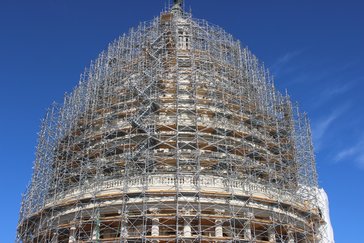 It has to be created. We can’t fix ourselves to a better future. We have to generate new thinking and new systems, formal and informal, that will drive better process. In my work with youth and in education, people talked a lot about dropout prevention, drug and alcohol prevention, violence prevention and the like. I countered with the obvious, if silly sounding, declaration: we will never prevent young people to success. Prevention in these traditional forms is all about focusing on narrow problem sets that we arbitrarily isolate, even as many of the same youth traverse them all. To help them define and find success, we have to create something new, something better, within young people and around them. Similarly, preventing bad policy, while certainly critical in the short term, won’t build a healthy democracy. Our protests and actions in the streets, while a strong and important exhibition of democracy, could easily be cast more accurately as the prevention of tyranny. Clearly, we need to stay activated, but we also need to make sure we plan and create and build more democratic systems beyond the resistance. A purely problem-solving orientation, whether called prevention or resistance or anything else, traps us in the premise and circumstance of the problem. Solving one problem gets us to the next, which is probably just an iteration of that which we have already solved. If we want a different future, we must create a different future. We must rethink and reestablish the norms, relationships, and basic political foundations that keep producing the same old problems. Otherwise, we will just keep fixing things, stay really busy, get burnt out, and never really get anywhere. (Check out the work of Robert Fritz for more on this train of thought.) For starters, for democracy:
We can’t all argue in front of the Supreme Court or create our own legislation. All of us won’t run for office. But, every one of us can sign someone up to vote. We can vote ourselves. We can volunteer for a campaign, or serve on a board. Every one of us can write our elected officials, remind them that we are paying attention and that our voice matters. We can write op-eds or blogs or something more thoughtful than Tweets and Facebook rants. Per President Obama’s urging, we can have actual conversations with people who don’t agree with us. Every one of us can be more democratic in our interactions within our community, our work, or even just with friends. Every one of us can value the collective, can think of others, can be more critical of and reflective on our own isolation, need for confirmation, and self-righteousness. I believe this is how we create democracy. So, each of us has that power and that responsibility. Yes, we can create democracy. We don’t have a choice. Image: foreigndaze.com 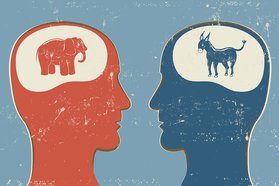 Years ago, while commiserating about limited access to higher education for low-wealth students, a colleague offered a thought: “Every system is perfectly designed to deliver the outcomes it delivers.” If you think on that for just a moment…(go ahead, do it!)…it’s both painfully obvious and painfully…well…painful. But, for anyone working to change the outcomes that are important to them in education, politics, justice, or otherwise, this simple statement tells us where our efforts must be directed: the systems that we have, advertently or inadvertently, designed to underperform (or to perform exceptionally toward outcomes we never intended). Under this premise, the school system that is struggling with dropouts is perfectly designed to generate those dropouts. The justice system that incarcerates men of color at dramatically higher rates than anyone else is perfectly designed to incarcerate men of color. The political system that generates corruption, gridlock, and weak candidates is perfectly designed to do just that. System performance is not the sum of its individual elements. It is the interrelated (systemic) performance of its elements. Systems get misaligned because we build and invest (or disinvest) in them element by element often over long periods of time, and amidst shifting values and visions. And, the more we address individual elements in isolation the more likely we are to create systemic dissonance (the type of boiling-frog dissonance we actually grow to accept). Within an organizational system, for example, perhaps we have rewritten our values statement, but our organizational structure is out-of-date or even arbitrary. We revisit our investments (budget, people, etc.), but align them with our organizational structure rather than our strategy (this is my new definition of bureaucracy, by the way). We clarify and document our desired outcomes, but we maintain old strategies that have lost relevance in a changing environment. We improve our product or service delivery, but never invest in our human capital pipeline to support and sustain it. When we see systemic failure, we cannot blame the system without owning our role in it. We cannot claim that our part of the system is working, and it’s everyone else’s that’s broken. We cannot do fragmented and narrow work and believe it will add up to a healthy system. It won’t. If we are going to create the system that is perfectly designed to deliver the outcomes we actually want, we need to design, invest, and lead systemically. image: http://www.intelligencesquaredus.org/  And, I promise I will stop trying to convince you. Convincing doesn’t work, and it never has. And, it’s making us dumber. Convincing is a form of coercion. Power imposed. It seeks conquest of the others’ perspective (action), which usually only retrenches the others’ perspective (reaction). Think about a time when you knew someone was trying to convince you of something counter to your beliefs. How did you respond? I know my initial response is usually to defend and challenge, if for nothing else, the sport of it. In fact, I have never been convinced of anything, and, I bet, you haven't either. When it seems like we have been convinced, what has actually happened is that we have learned. Someone has shared a new perspective in a way that we could understand. They have provided new information that we were able to consume. They have posed a question that gave us a safe space to rethink our assumptions. They have done something that has enabled us to reflect on our positions in a way that alters them. Something has happened within us. They haven’t imposed it, forced it, or made it so. They haven’t convinced us. They have provided a prompt and/or an environment in which we could convince ourselves. This is teaching/learning. This is the open exchange of power. In a post-truth America, understanding this dynamic is even more critical. There will always be facts, “facts”, and “alternate facts” that will make any case on anything. We can always find someone on the Internet who agrees with us, or we can say it enough times in enough places that it appears so. This emboldens those who want to convince and bolsters the defense of those who won’t be convinced. The logical conclusion of this dynamic then is a stalemate, the end of teaching and learning, a perpetual confirmation bias arms race with the chilling effect of an intellectual Cold War. Stop convincing. Start teaching. Stop being convinced. Start learning. It’s critical to our relationships and fundamental to our democracy. You’ll never convince me otherwise. 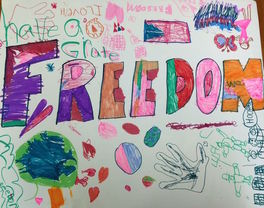 I got this question on the way to daycare the other day, on my first morning heading back into work after a few days off for the holidays. I appreciate my four year old starting my day with an easy question. She heard the word in a song on the radio. I stumbled through some answer about having choices and opportunities to do the things you want. I was immediately unsatisfied with my answer but, at that time of morning, I was not yet able to muster one that could do the concept justice, and be consumable by my daughter. After I dropped my girls off, I reflected on what I should have answered and got really mad at myself as I continued on my way to work. Regardless of what she processed, I had answered her with the myopic and self-centered version of freedom that I detest, and that I think is at the source of our stumbling Democracy, presumed to be based on the concept. I had regurgitated a slogan. I had delivered a sense of freedom that conflates principles of capitalism with those of democracy. I had conveyed to my daughter that it was all about her, places she could go, things she could do, objects she could possess. I had defined an individualized version of freedom that is at the source of structural privilege and thus reinforces an acceptance that different people in our country inherently have access to different levels of freedom. I had shared a version of freedom that I hope, more than anything I can accomplish as a parent, she will fight like hell against. My children are privileged, just like I am privileged. I have written before about how privilege goes unnoticed in the privileged, becomes entitlement, supremacy. And, it goes unnoticed largely because the experiences of the privileged are generally free. There are no structural barriers or institutional resistance that challenge our daily lives. I basically get to do what I want to do, go where I want to go, buy what I need to buy and generally live without too much friction that I don’t create for myself. I’ve got freedom. So, I could easily assume these experiences define the term. The freedom of privilege. But, my freedom is bound fundamentally with the freedom of others. Like justice, there is no freedom for some and not for others in a society that is premised on the ideal. So, my sweet child, let me revisit: freedom isn’t about you. It’s about us, all of us. It’s about having a sense of responsibility for others that is as strong or stronger than the one we have for ourselves. It’s about holding ourselves accountable for doing more than accepting the fruits of our privilege, being more than the freedoms offered us because of the way we look, how we talk, our physical abilities, how we worship, or who we love. Freedom is something that is creative, generative. Freedom is not consumed. It does not have lines of demarcation. Freedom is a fight but it should never be a weapon. So, let’s listen to that song again. Let’s lift our voices for a better definition of freedom and know that it is one we will have to create together.  Those of us who are privileged wear our privilege like a feather; not like a feather in a cap or some showy accessory, but like a tiny feather left on our shoulder after we take off a down-filled winter coat. A feather we don’t notice, we didn’t put there, we don’t feel. A white feather. For us even to notice its presence requires a good look in the mirror (a mere glance typically won’t do it), or for someone to point it out for us. When we see it, this white feather, this privilege, we wonder who else noticed it. How long has it been there? Where did it come from? Why haven’t we noticed it before? Privilege is weightless for the privileged. Or, at least, privilege unnoticed, unnamed, or unaccepted is weightless for the privileged. Weightlessness is implicit to privilege because the weight of our privilege is being borne by those who aren’t. For them, our small, white, weightless feather carries the burdens of history, oppression, exclusion, and so much more. For them, the weight of our feather is often unbearable. So, what happens when we privileged start to understand this weight, even as we haven’t previously felt it or carried it for ourselves? When someone exposes our privilege, the weightlessness of that feather begins to change. When the social and cultural systems that have upheld our privilege and distributed its weight to others begin to evolve, that feather becomes a symbol of things we never knew or understood about ourselves. We feel embarrassed. Shamed. Confused. Indignant. Humbled. Angry. Lost. Defensive. The shifting of what was previously weightless can rattle the core identity of the white male who believes he is supposed to dominate politics, the boardroom, the factory floor, or household, but no longer feels so dominant. This shifting antagonizes and undermines the singularity of one religious narrative, creating space for other beliefs, valuing dialogue over dogma. It surfaces and challenges our judgment and pity of those less fortunate, those with disabilities, those with mental illness. Suddenly, this soft, feathery lightness of privilege rips violently at the meaning and history of our whiteness, maleness, faith, socio-economic status, gender identity, mental and physical abilities. It shakes our foundation, and we don’t typically like our foundation being shaken. After all, we are standing on it. And, when this happens, we privileged choose one of two paths forward: we grow and evolve given this enlightenment, rebuilding a broader and stronger foundation, or we retrench and defend our pre-enlightenment state and cling to our past, now fractured, foundation. The struggle between these two paths is real and is on display every day. Just watch the news. Listen to the political and economic discourse. Watch the rallies. Observe the angst in our own communities and schools. But, here’s the deal: denial of privilege is just that. It doesn’t make it not true. The feather is there. Most of us see it. And, yes, it is moving. The question is: will we privileged begin to shoulder its weight or use our privilege to continue to push that burden onto others? 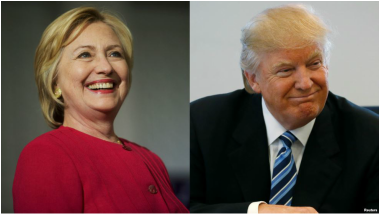 Many years ago, while drinking coffee and riffing in deep disillusionment on the state of the world, or our community, or our schools, or who-knows-what, my brother and I started satirically plotting a new leadership book on how to achieve truly soul-less leadership. Perhaps this exposes a bit about both our geekiness and our intensity! I ran across the notes from that conversation just the other day. As I read them, I didn’t laugh nearly as much as when we were talking. I didn’t laugh at all. Instead, I found them shockingly relevant, even more so than back then, perhaps tonight more than ever. Here are a few of our snarky and seemingly outlandish thoughts that were funny back then but more grounded in leadership, and specifically political, reality today; and thus terrifying: Attributes of Soul-less Leadership
Skills of Soul-less Leadership Externalization Blame Obfuscation Powerful communication of a powerless message Avoidance The Soul-less Leadership Loop The soul-less leader seeks a path to the self that is self-affirming. The soul-less leader seeks to lead to justify his own leadership. The soul-less leader seeks only insights that confirm the correctness of his own insights Today, I don’t want to be cynical or disillusioned. I try every day not to be. But, anyone paying attention, I assume, sees many, if not all, of these attributes on display every day in our local and national politics. So, for tonight, for this Presidential Debate, rather than make a cynical or disillusioned assumption, I will leave it as a question for each of us to ponder and observe: as the two people vying to lead our country debate and discuss their ideas, who will have the courage to show us their soul? 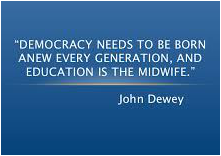 I don’t want to make too much of one day off of school for students, but I do think it is worth noting the symbolism and perhaps extrapolating that a bit to a bigger issue with our system of public education and its relationship to our democracy. This past Election Day, our public schools were closed to students. It was a day off. The day we could have connected basic math with the importance of voting; the day we could have brought together ratios with political representation; the day we could have connected geometry with gerrymandering; the day we could have applied statistics to get-out-the-vote strategies. The day math could have felt really real and really important and with its application visible on the news and on the internet and in social media. We took it off. That same day we could have talked about political speech and persuasive writing in English class and then read it, watched it live, or practiced it ourselves; the day we could have talked about the past, present, and future aspects of voting rights in History or Social Studies, looked at real ballots and tracked live voting across the country, even held our own mock elections on the issues; the day we could have used examples of contentious political discourse to talk about conflict resolution and effective communication. The day school could have been about democracy. The day it would have had immediate meaning, live examples, and real-world implications. We took it off. Election Day is that day when all of our talk about how critical education is to a functioning democracy could reach its culmination and could feel real and tangible for our young people in our schools. It’s a day we could talk about rights and responsibilities, citizenship, leadership and so much more that would improve our schools, communities, and political system. I fear the merely theoretical connection we make between education and democracy. In theory, we all know how critical an educated, informed, and engaged populace is to the sustainability of this huge, democratic experiment our country is living and manifesting. And yet, I look at the direction of public education and the realities of abysmal voter turnout and I know we are living in theory. On Election Day, we have more opportunities to create and sustain a healthy democracy than just casting a vote. Unfortunately, most of us took it off. |
Categories
All
Archives
April 2024
|


 RSS Feed
RSS Feed